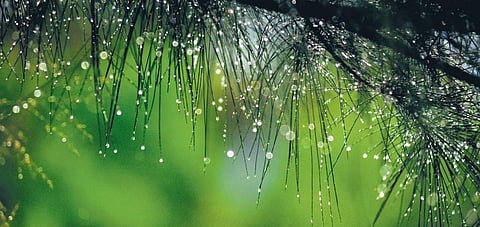

KOCHI: Rain inspires conversations, romance, poetry, nostalgia and, in some cases, dread and gloom. But no matter how it falls, rains always bring along a sense of wonder and awe. With its enigmatic aura, rain has long been associated with tender emotions and sentimental yearnings. The rainy season exudes an intimate atmosphere, nudging one to indulge in the warmth of human connection and shared experiences.
With the monsoon making a splash with its late arrival in Kerala, a recent chat with a friend revolved around how the ethereal blanket of grey clouds makes one’s soul pine, like a kindergarten kid, to snuggle up and doze off to the gentle pitter-patter lullaby. Consider it a blessing, the ultimate privilege, if one gets to do it.
The chat eventually led me to the word somnolence, which is defined as a “state of drowsiness” or a “strong desire to fall asleep”. It is often used in medical parlance as well, especially in cases of sleep disorders.
Rain, I realise, can invigorate and inspire research as well. Getting to some basics, the word ‘rain’ is thought to have originated in the Proto-Germanic language, which was spoken by the Germanic peoples in northern Europe about 2,000 years ago.
The Proto-Germanic word ‘regnōn’ meant “water that falls from the sky”, and the verb ‘regnjan’ meant “to cause rain to fall”. ‘Regnōn’ is thought to be derived from the Proto-Indo-European root ‘reg-’, which means “to flow”. This root is also found in other Indo-European languages, such as the Latin word ‘regere’ (to rule) and the Greek word ‘rhein’ (to flow).
So, this ‘regnōn’ ended up in Old English (5th to 11th century) as “regn”. And the first use of the word was in the poem ‘Beowulf’, written by an “unknown” author between 8th and 11th centuries. The divine combo of poetry and coffee fuels further research. According to the Etymology Dictionary, the word ‘monsoon’ has its roots in the Arabic term ‘mawsim’, meaning “time of year, appropriate season (for a voyage, pilgrimage, etc.)”.
“The Arabic word, picked up by Portuguese sailors in the Indian Ocean, was used for anything that comes round every year (such as a festival), and was extended to the season of the year when the monsoon blows from the southwest (April through October) and the winds were right for voyages to the East Indies,” the dictionary notes.
The Portuguese called the “alternating trade wind” of the Indian Ocean ‘monçao’. And, later, the Dutch termed it ‘monssoen’. This was later adopted into various languages, including English. Rains can be polarising, too. There are those who fear or have a strong aversion to rain. Ombrophobe comes from Greek ‘ombros’, meaning ‘storm of rain’, and ‘phobos’, meaning ‘fearing’.
On the other side, there are those who love the rain, like yours truly. Call us pluviophiles. The word comes from the Latin words ‘pluvius’, meaning “rain”, and ‘philos’, meaning ‘lover’. No talk on love of rain shall be complete without the mention of petrichor – the earthy fragrance that arises when rain meets soil. It’s a balm for the weary soul (pardon the cliche), grounding us in the here and now.
The word ‘petrichor’ is derived from the Greek words ‘petra’, meaning ‘stone’, and ‘ichor’, referring to the fluid that flows through the veins of the gods in Greek mythology. Interestingly, the term was coined, in 1964, by Australian scientists Isabel Joy Bear and Richard Thomas, who conducted research on the chemical composition of the smell of rain. They discovered that the enchanting fragrance was caused by a combination of terpenes and geosmin.
Now, terpenes are oils secreted by plants during dry periods, and they are absorbed by the soil and rocks. When it rains, the terpenes are released and they mix with geosmin, a compound produced by actinobacteria. And the result is sweet petrichor. Beautiful.
Okay, time for me to go wallow in somnolence with some filter coffee. You guys have a safe, snuggly weekend ahead.
Mizzle: “a light, fine rain”
Pitter-patter: “sound of light rain falling”
Downpour: “a heavy fall of rain”
Cloudburst: “a sudden, heavy downpour”
Deluge: “a very heavy fall of rain”
Torrent: “strong and fast-flowing stream of water”
Torrential: “falling in very heavy, rapid downpours”
Pluvial: “relating to or caused by rain”
Gush: “sudden, strong flow of water”
Squall: “sudden, strong wind with rain or snow”
Zud: “sudden, violent rainstorm that can cause flooding and mudslides”
Spritz: “to sprinkle lightly with water”
Sposh: “soft, slushy mud or snow”
Onding (Scottish): “a heavy fall of rain or snow”
Skift: “a light fall of rain or snow”
Sleet: “frozen or partly frozen rain”
Gusty: “characterised by strong, sudden bursts of wind often accompanying rain”
Overcast: “when the sky is completely covered with clouds, blocking out sunlight”
Soggy: “very wet or waterlogged”
Raindrop race: “a playful activity of observing raindrops on a windowpane and seeing which ones reach the bottom first”
Rain stick: “a musical instrument, typically made from a hollowed-out cactus stem filled with pebbles, creating a sound resembling falling rain”
Rainy day fund: “money set aside for unexpected expenses or emergencies”
Thunderclap: “a loud and sudden sound of thunder, often accompanying a thunderstorm”
Rain curtain: “a visual effect created when heavy rain falls in a dense, almost opaque wall”
Bengy: “an old southeast English dialect word meaning ‘overcast’ or ‘threatening rain’”
Spate: “a sudden and heavy flow of water, especially a flood”